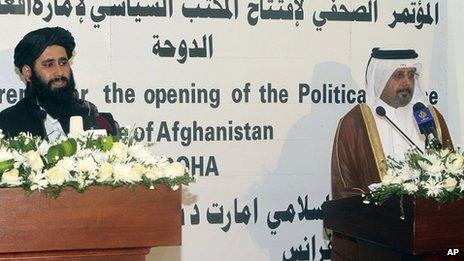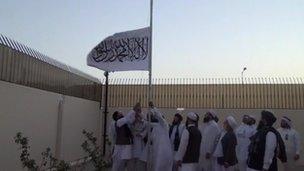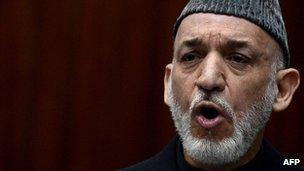Can Taliban office row derail peace talks?
- Published

The opening of the Taliban office was initially hailed as a breakthrough
After nearly 12 years of relentless bloodshed in Afghanistan, it is hard to believe that long-awaited peace talks with the Taliban could now be thrown off course by something as simple as a row over a flag and a ceremonial plaque.
Yet that is exactly what has happened.
When the Taliban opened their office in the Gulf state of Qatar on Tuesday, it was hailed as a breakthrough.
Hosted by Qatar and brokered by the Americans, this was supposed to be a bureau for peace talks, a venue in which to sit down and settle the conflict over the negotiating table rather than on the battlefield.
But the small delegation of turbaned Taliban went further: to the strains of verses from a Pashtu anthem, they raised the white flag and black Koranic verses of the Taliban on a flagpole inside their compound.
They put up a sign reading "Political Office of the Islamic Emirate of Afghanistan".
Their Qatari hosts looked on applauding, apparently unaware of the fury this would cause in Kabul.

Despite the pressure, the Taliban hoisted its flag again - on a shorter flagpole
Sensitive issues
To the government of President Hamid Karzai, this was tantamount to setting up a rival embassy.
After awkward phone calls the Taliban were persuaded to remove the offending plaque and take down the flag.
At 11:30 on Thursday the flagpole came down. By 14:00 it was back up.
This time it was lower, not quite poking over the top of the Taliban compound wall - but still clearly visible through a gap.
"No filming inside!" shouted a plain-clothes Qatari security man as the media set up their cameras outside the now silent and deserted building.
For Kabul, this episode reinforces the government's distrust of the Taliban.
The peace talks with US diplomats that had been due to begin here on Thursday were supposed to be followed swiftly by Afghan-to-Afghan talks.
Neither have begun, and after the row erupted the Taliban delegates turned off their phones and went to ground.
Qatar-based analyst Michael Stephens says this spat does not bode well for future peace talks.
"America has underestimated the difficulties and the gap between the Taliban and Hamid Karzai and his government.
"They have not understood fully how sensitive the issues in talking to the Taliban in an official capacity are, and how this undermines Hamid Karzai."
'Valuable prize'

President Karzai said the Qatar talks must be run by Afghans
Despite the high tempers in Kabul, there is simply too much resting on this process to abandon it now.
For the US and its allies, a major threshold has already been passed: this week the Taliban reassured the world they did not want Afghanistan to be a base to attack anyone else. That is shorthand for saying they will not be coming back hand-in-hand with al-Qaeda.
Some don't believe them, some see the Taliban as equally malign.
But for the US, that has lost more than 2,000 servicemen and women to this conflict, a de-facto Taliban assurance that there will be no repeats of the 9/11 attacks planned from Afghan soil is a valuable prize.
For the Taliban, their immediate aim is to secure the return of five of their senior officials from US custody in Guantanamo Bay.
In return they have indicated they will offer give up their only US captive, Sgt Bowie Bergdahl, who was seized in 2009.
In the longer term they will want to know just how much power and autonomy they can expect in a future Afghan government, especially in the Pashtun-dominated south, once international combat forces withdraw by the end of 2014.
For all sides, the spectre hanging over the talks is that if they fail completely then Afghanistan could face the nightmare scenario of a return to the sort of the devastating civil war that tore the country apart in the 1990s.